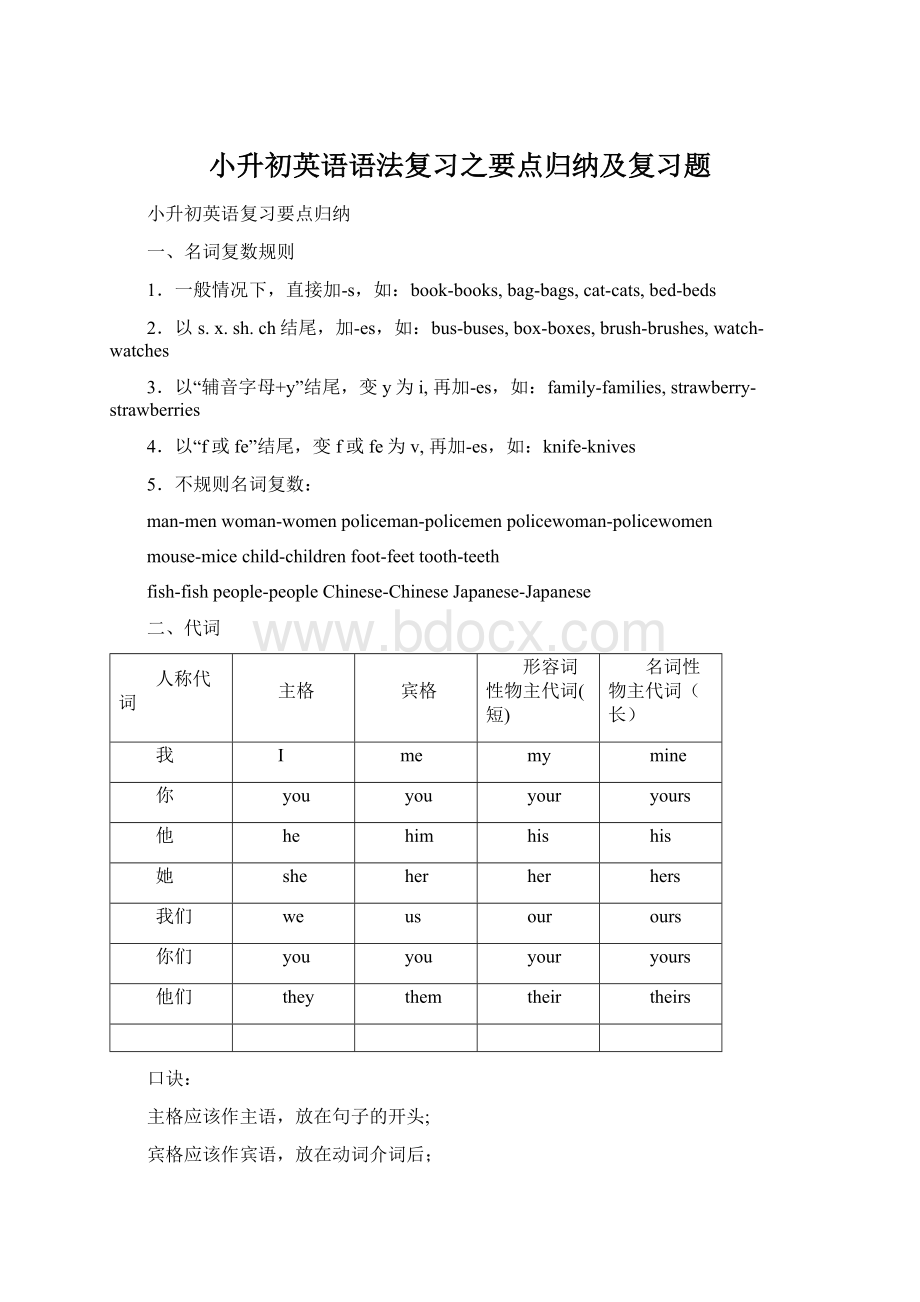小升初英语语法复习之要点归纳及复习题.docx
《小升初英语语法复习之要点归纳及复习题.docx》由会员分享,可在线阅读,更多相关《小升初英语语法复习之要点归纳及复习题.docx(27页珍藏版)》请在冰豆网上搜索。

小升初英语语法复习之要点归纳及复习题
小升初英语复习要点归纳
一、名词复数规则
1.一般情况下,直接加-s,如:
book-books,bag-bags,cat-cats,bed-beds
2.以s.x.sh.ch结尾,加-es,如:
bus-buses,box-boxes,brush-brushes,watch-watches
3.以“辅音字母+y”结尾,变y为i,再加-es,如:
family-families,strawberry-strawberries
4.以“f或fe”结尾,变f或fe为v,再加-es,如:
knife-knives
5.不规则名词复数:
man-menwoman-womenpoliceman-policemenpolicewoman-policewomen
mouse-micechild-childrenfoot-feettooth-teeth
fish-fishpeople-peopleChinese-ChineseJapanese-Japanese
二、代词
人称代词
主格
宾格
形容词性物主代词(短)
名词性物主代词(长)
我
I
me
my
mine
你
you
you
your
yours
他
he
him
his
his
她
she
her
her
hers
我们
we
us
our
ours
你们
you
you
your
yours
他们
they
them
their
theirs
口诀:
主格应该作主语,放在句子的开头;
宾格应该作宾语,放在动词介词后;
形容词性的物主代词不能单独用,必须接名词或其他词;
名词性的物主代词,单独使用就可以。
如:
Iamastudent.wWw.Xkb1.cOm
Whatisyourname?
Hisbagisonthedesk.Thatoneisnothis.
WecanfromAmerica.Wearefriends.
Letmehelpyou.
Theseshoesarenice.Trythemon.
Theyaredrinkingtea.
三、动词
1.be动词:
amisare
2.普通动词:
havegocometakegetbuypass
sitstandhavetalkwalkseecatchput等。
动词的变化形式:
动词的第三人称单数、动词+ing、动词的过去式(详见时态)
3.情态动词:
情态动词can,must,should后面直接用动词原形。
如:
I/He/She/Theycansing.
Youshouldkeepquietinthelibrary.
Youmustn’tplaywithfire.
Canyouhelpme?
4.使役动词:
have,make,let后面直接用动词原形。
如:
Letmehelpyou.
MothermadeJimstayathomeallday.
四、疑问词
1.whatwhowhosewhichwherewhenwhyhow
2.“Wh-”questions:
Whatareyoudoing?
Whatcolourisit?
Whattimeisit?
What’sthetime?
Whichisyourwatch,theyellowoneorthewhiteone?
Who’sthemanwithabignose?
Whosebagisit?
Whenisyourbirthday?
Whereismyballpen?
Whydoyoulikesummer?
Howmanybooksarethereintheschoolbag?
Howoldistheyoungman?
Howmuchisthetoybear?
Howdoyougotoschooleveryday?
五、形容词和副词
bigsmalllittlelargetalllongshortfat
thinoldnewyoungcleandirtywarmhot
coolcoldfastslowlazybusycheap
earlylatehighlowtiredhungrythirsty
beautifuldeliciousexpensivefavouritefriendlypopular
六、比较级和最高级
1.一般在形容词或副词后+er
oldertallerlongerstronger
2.多音节词前+more
moreinterestingmoreexciting
3.双写最后一个字母,再+er
biggerfatter
4.把y变i,再+er
heavierearlier
5.不规则变化:
well-bettermuch/many-more
6.favourite没有比较级和最高级
如下表:
形容词(原级)
比较级
最高级
old
older
theoldest
new
newer
thenewest
thin
thinner
thethinnest
big
bigger
thebiggest
heavy
heavier
theheaviest
early
earlier
theearliest
boring
moreboring
themostboring
difficult
moredifficult
themostdifficult
expensive
moreexpensive
themostexpensive
七、介词和副词
inonatunderinfrontofbehindafteroveracross
intooutofbesidenearnextto
八、some和any
Ihavesometoysinmybedroom.
Doyouhaveanybrothersorsisters?
Therearesomebooksonthedesk.
Arethereanybooksonthedesk?
九、时态
(一)一般现在时,通常用“usually,often,everyday,sometimes”。
1.一般现在时表示经常或习惯性的动作,也可表示现在的状态或主语具备的性格和能力。
2.一般现在时中,没有be动词和情态动词,主语为第三人称单数的肯定句,动词要按规则加上s,主语是非第三人称单数的肯定句,动词用原形。
3.在一般现在时中,句中有be动词或情态动词时,否定句在be动词和情态动词后加not,一般疑问句将be动词或情态动词放在句首。
4.在一般现在时中,句中没有be动词或情态动词时,主语为第三人称单数的否定句在动词前加does+not(doesn’t),一般疑问句在句首加does,句子中原有动词用原形;主语为非第三人称单数,否定句用do+not(don’t),一般疑问句在句首加do,句子中动词用原形。
动词+s的变化规则
1.一般情况下,直接加-s,如:
cook-cooks,milk-milks
2.以s.x.sh.ch.o结尾,加-es,如:
guess-guesses,wash-washes,watch-watches,go-goes
3.以“辅音字母+y”结尾,变y为i,再加-es,如:
study-studies
(二)现在进行时bedoing,通常用“Look!
”“now”.
1.现在进行时表示现在正在进行或发生的动作,也可表示当前一段时间内的活动或现阶段正在进行的动作。
2.现在进行时的肯定句基本结构为be+动词ing.
3.现在进行时的否定句在be后加not。
4.现在进行时的一般疑问句把be动词调到句首。
动词加ing的变化规则
1.一般情况下,直接加ing,如:
cook-cooking
2.以不发音的e结尾,去e加ing,如:
make-making,taste-tasting
3.如果末尾是一个元音字母和一个辅音字母,双写末尾的辅音字母,再加ing,如:
run-running,stop-stopping
(三)一般将来时
begoingto
1.begoingto表示将要发生的事或打算、计划、决定要做的事情。
2.肯定句:
begoingto+动词原形,如:
Jimisgoingtoplayfootball.
否定句:
benotgoingto+动词原形,如:
Jimisnotgoingtoplayfootball.
一般疑问句:
把be动词调到句首,如:
IsJimgoingtoplayfootball?
特殊疑问句:
疑问词+be+主语+goingto+动词原形?
如:
WhatisJimgoingtodo?
疑问词当主语时:
疑问词+be+goingto+动词原形?
如:
Whoisgoingtoplayfootball?
will
1.表示将要发生的事。
2.肯定句:
Iwillgotothezootomorrow.
否定句:
Iwillnot(won’t)gotothezootomorrow.
一般疑问句:
Willyougotothezootomorrow?
特殊疑问句:
Whowillgotothezootomorrow?
Wherewillyougotomorrow?
Whenwillyougotothezoo?
(四)一般过去时
1.一般过去时表示过去某个时间发生的动作或存在的状态,常和表示过去的时间状语连用。
一般过去时也表示过去经常或反复发生的动作。
2.Be动词在一般过去时中的变化:
⑴am和is在一般过去时中变为was。
(wasnot=wasn’t)
⑵are在一般过去时中变为were。
(werenot=weren’t)
⑶带有was或were的句子,其否定、疑问的变化和is,am,are一样,即否定句在was或were后加not,一般疑问句把was或were调到句首。
3.句中没有be动词的一般过去时的句子
否定句:
didn’t+动词原形,如:
Jimdidn’tgohomeyesterday.
一般疑问句:
在句首加did,句子中的动词过去式变回原形。
如:
DidJimgohomeyesterday?
特殊疑问句:
⑴疑问词+did+主语+动词原形?
如:
WhatdidJimdoyesterday?
⑵疑问词当主语时:
疑问词+动词过去式?
如:
Whowenttohomeyesterday?
动